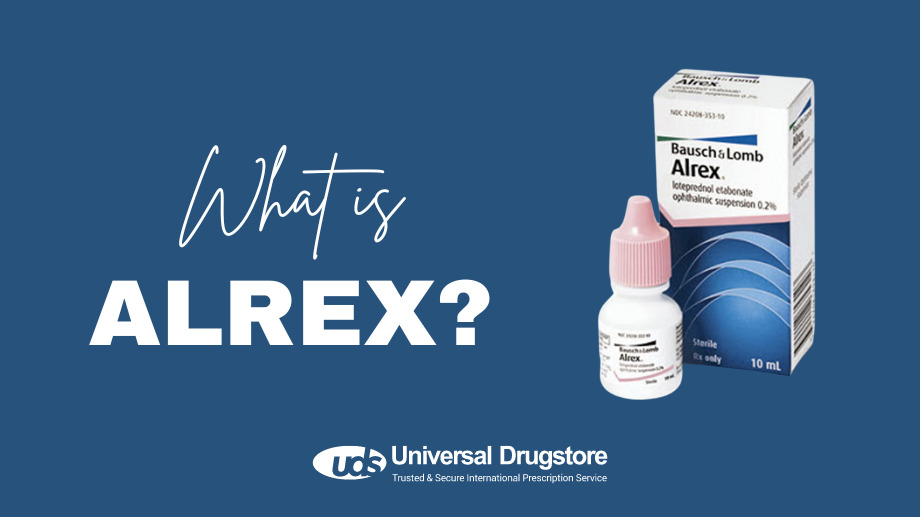What is Alrex?


Alrex (loteprednol etabonate ophthalmic suspension) is a corticosteroid used to treat eye inflammation, including symptoms of seasonal allergic conjunctivitis or conjunctiva (redness, itching, swelling, dry eye), iritis, and shingles (herpes zoster). Alrex can also be used to treat irritations related to eye surgery. Eysuvis, Inveltys, Lotemax, and Lotemax SM are other brand names of this medication, which can be used for the same treatment of eye-related conditions. Alrex is manufactured by Bausch & Lomb Incorporated.
How does Alrex work?
Alrex is an eye drop medication that contains the active ingredient loteprednol etabonate, 0.2%. It is an ophthalmic corticosteroid (or steroid) used to temporarily relieve different eye conditions and inflammations when administered directly to the affected eye. However, Alrex is contraindicated in viral diseases of the eye, including conjunctiva and diseases of the cornea.
What doses of Alrex are available?
Alrex is available as a 0.2% ophthalmic suspension. Other brand names of this medication come in different strengths and dosage forms, including a 0.25% suspension (Eysuvis), 0.5% gel or ointment (Lotemax), and 1% suspension (Inveltys).
How do you use Alrex?
Ensure you follow all directions given by your healthcare provider, and read all drug information on the medication guide and instruction sheets. Wash your hands thoroughly before administering this medication. Do not use Alrex while wearing contact lenses or soft contact lenses, as a preservative (benzalkonium chloride) used in Alrex may stain them. Wait 15 minutes after using Alrex to insert any kind of contact lens.
Shake the medication well before each use. Tilt your head back and gently pull your lower eyelid down to create a pocket (sac) for the eye drops. Hold the dropper tip upside-down above your eye and squeeze one drop of Alrex into your lower eyelid. Do not touch the dropper tip to your eye as this may lead to contamination. Close your eyes to allow the medication to settle before applying any additional drops prescribed by your healthcare provider.
What are the side effects of Alrex?
The most common side effects of Alrex include:
-
Slight burning sensation during instillation
-
Sensitivity to light
-
Mild eye pain
-
Temporary blurred vision
-
Eye discomfort
-
Dry or watery eyes
-
Headache
-
Runny nose
-
Sore throat
Rarely, Alrex may cause some serious side effects, including:
-
Photophobia (sensitivity to light)
-
Severe eye pain during instillation
-
Prolonged or worsening redness and itching
-
Eye swelling, including trouble closing your eyes
-
Prolonged or worsening vision changes
-
Vision problems, including tunnel vision
-
Foreign body sensation
-
Allergic reaction
-
Signs of eye infection, including the symptoms of:
-
Discharge
-
Swelling
-
Redness
-
-
Prolonged use of Alrex may cause:
-
Increased intraocular pressure (IOP)
-
Cataract formation
-
Fungal infections of the cornea
-
Damage to the optic nerve
-
Delayed wound healing
-
Secondary ocular infections
-
Contact your healthcare professional for medical advice about any possible adverse effects you experience while taking Alrex. You can report your adverse effects to the FDA at 1-800-FDA-1088 or www.fda.gov/medwatch.
Alrex drug interactions
When Alrex is taken with other prescription drugs, over-the-counter medications, vitamins, and supplements, it may change how they work or increase the frequency or severity of side effects. Some drug interactions with Alrex include:
-
Amprenavir
-
Berotralstat
-
Cyclosporine ophthalmic
-
Delavirdine
-
Diclofenac ophthalmic
-
Erythromycin
-
Flurbiprofen ophthalmic
-
Ketorolac ophthalmic
-
Lonafarnib
-
Posaconazole
-
Smallpox vaccine
Alrex precautions
You should be sure that your healthcare provider is aware of all your medical conditions, including if you have:
-
Preexisting eye infections or eye diseases (including herpes simplex)
-
Glaucoma
-
Cataracts, or have had cataract surgery
-
Other recent eye surgeries
-
Adverse reactions to corticosteroids
-
Severe nearsightedness (myopia)
-
Diabetes
-
Are pregnant, may become pregnant, or breastfeeding
-
Are younger than 18 years old
-
Wear contact lenses or soft contact lenses
Is there a generic available for Alrex?
Yes, loteprednol etabonate (suspension drops/ophthalmic) is the generic for Alrex.
How do you store Alrex?
Alrex should be stored in its original container at room temperature between 59°F to 77°F (15°C to 25°C) away from light and moisture. The dropper should be stored upright with the tip sealed between uses. Do not store Alrex in the bathroom and keep away from pets and children.
Related medications
Alrex is an ophthalmic corticosteroid. Other medications that serve this purpose include:
Sources
Drugs.com https://www.drugs.com/mtm/alrex-ophthalmic.html
WebMD https://www.webmd.com/drugs/2/drug-7329/alrex-ophthalmic-eye/details
Bausch (manufacturer) https://www.bausch.com/products/rx-pharmaceuticals/allergy-eye-relief/#alrexIsi
RX Saver https://www.rxsaver.com/drugs/alrex
Good RX https://www.goodrx.com/alrex


